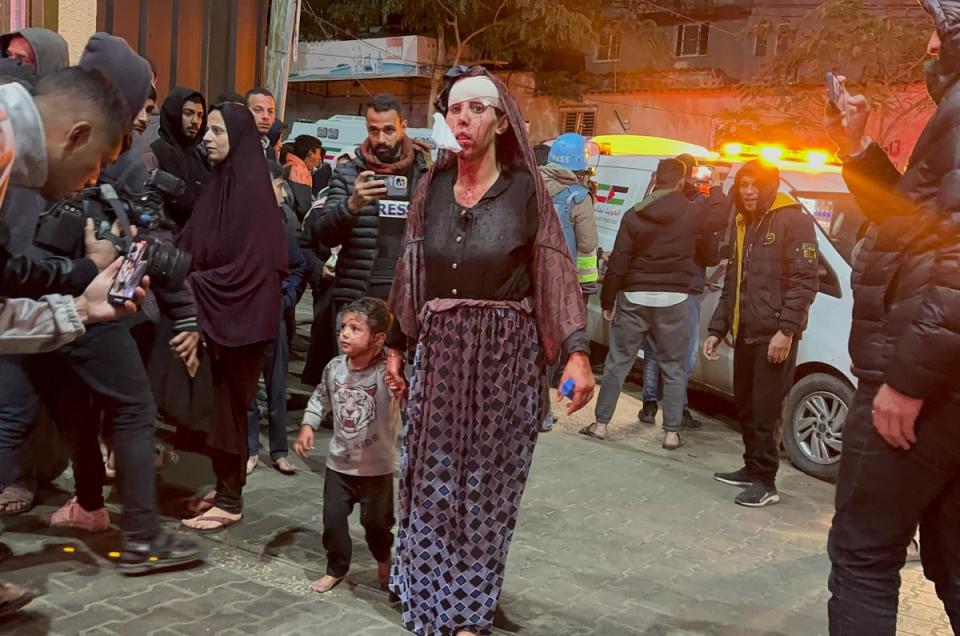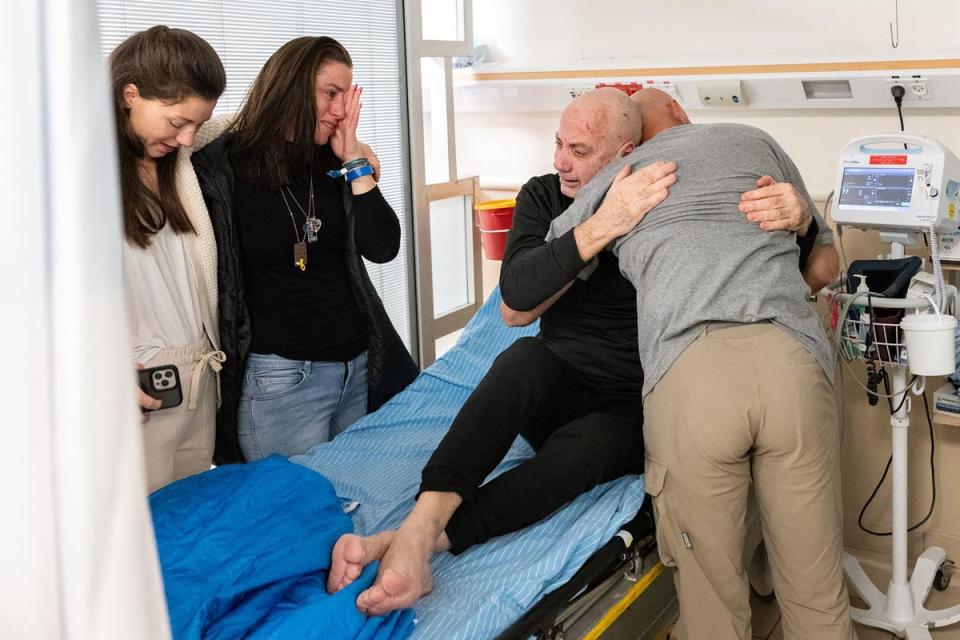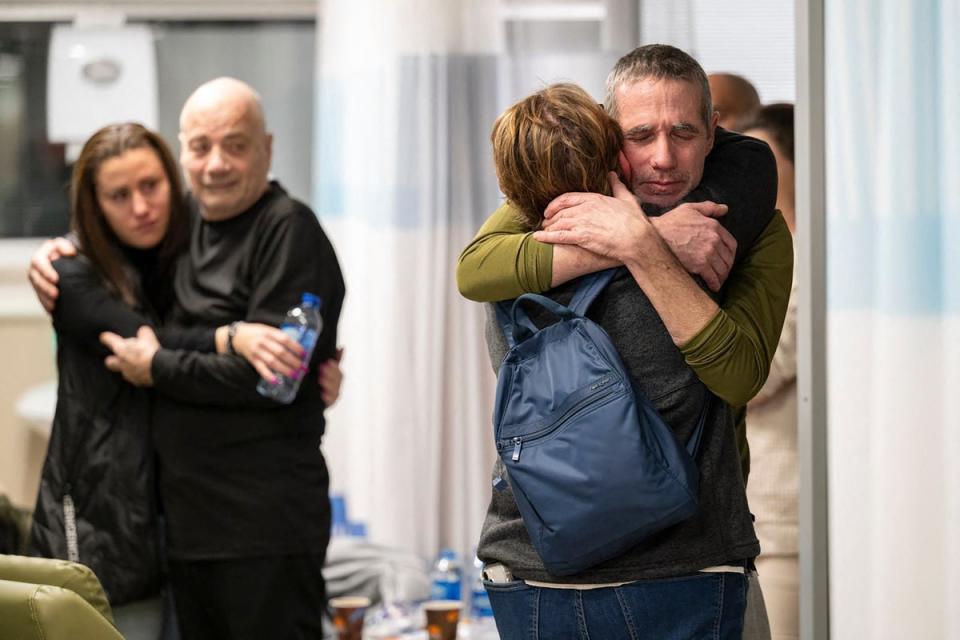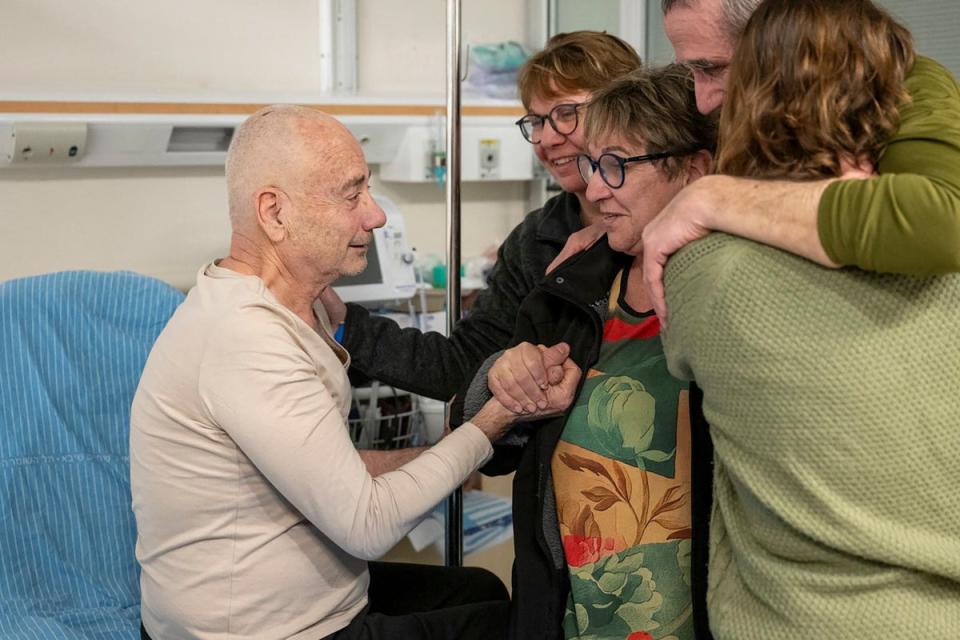At least 67 dead in Israel airstrikes on Rafah refugee camp as two hostages rescued
Israel says it has rescued two hostages held by Hamas in Gaza’s Rafah refugee camp during a raid and airstrikes which local health officials say killed 67 Palestinians and wounded dozens more.
It comes amid growing fears of a major Israeli ground offensive into Rafah, a city that many refugees have been gathering in, located in southern Gaza. Israel went ahead with Sunday night’s raid despite US president Joe Biden calling on Benjamin Netanyahu to hold off invading Rafah until a plan was in place that would prevent massive civilian casualties.
Early on Monday morning the Israeli military confirmed it conducted a series of strikes on southern Gaza that have now “concluded”. The military said it struck “terror targets in the area of Shaboura”, a district in Rafah.

It added that two hostages were rescued from the captivity of militants in Rafah. The hostages have been identified as 60-year-old Fernando Simon Marman and Louis Har, 70, both of whom were captured by Hamas from Kibbutz Nir Yitzhak during the group’s 7 October terror attack on southern Israel.

“They are both in good medical condition, and were transferred for medical examination at the Sheba Tel Hashomer hospital,” a joint IDF and police statement read.

Mr Netanyahu suggested Israel would look to carry out more rescue operations like Sunday night’s, in spite of the high death toll.
“Fernando and Louis, welcome home,” he said. “I salute our brave fighters for the daring action that led to their release.
“Only continued military pressure, until total victory, will bring about the release of all of our hostages. We will not miss any opportunity to bring them home.”

The Argentinian government thanked Israel for the rescue of the two hostages, who were dual nationals of Argentina.
Heavy bombing on Sunday night caused widespread panic in Rafah – a city on the southern border with Egypt – where Palestinians fleeing Israel’s offensive and military advances have sought shelter. An estimated 1.4 million Palestinians are currently in the region after being displaced by Israel’s campaign against Hamas.
Israeli planes, tanks and ships took part in the strikes, hitting two mosques and several houses in the strip, residents said.
Ahmed*, 54, who works for the Palestinian Red Crescent, said he was shaken awake by huge explosions at 2am. His family fled their home in north Gaza earlier in the war so he was sleeping rough in a tent on the streets when the Israeli military launched their attack on Rafah.
“The sound of bullets was so close we gathered in a group and covered ourselves with blankets as we had nothing else,” he told The Independent.
“It was terrifying.”
Amjed* said the Israeli raid appeared to be focused on the al-Shaboura camp within Rafah, located a few minutes from where he was sheltering.
“It was a nightmare. We thought it was the start of the ground invasion, as we heard helicopter gunfire and flare bombings in the sky. We are [lucky] we are alive,” he said.
“Tens of families have started to flee back to Khan Younis and Deir al-Balah,” he added.
Khan Younis, just north of Rafah, has been the focus of a ferocious Israel's ground offensive in recent weeks and Deir al-Balah is in the centre of the tiny Gaza Strip.

The roads are incredibly dangerous, he added, “but people are desperate”.
Most of the Palestinians seeking refuge in Rafah were crammed into tents, makeshift shelters, schools or hospital grounds, having been uprooted multiple times by repeated Israeli evacuation orders over the past four months of war.
The Palestinian foreign ministry in the West Bank condemned Israel’s continued “mass massacres” in Gaza. “Israel is officially continuing to target civilians and transfer the war to Rafah to push the population to get displaced under bombardment,” it said on X/Twitter.
“The recent massacres of the occupation are evidence of the validity of international warnings and fears of catastrophic results of the expansion of the war to Rafah,” it added.
Ministry of Foreign Affairs and Expatriates// The occupation's #massacre in Rafah is evidence of the validity of warnings about the catastrophic dangers of its invasion.
Netanyahu commits mass massacres with a mentality of revenge, not victory and not in accordance with… pic.twitter.com/cbuS7iaZr9— State of Palestine - MFA 🇵🇸🇵🇸 (@pmofa) February 12, 2024
Israeli military spokesman Lt Col Richard Hecht said the operation in Rafah was very “complex”, adding: “We have been working a long time on this operation. We were waiting for the right conditions.”
Rear Admiral Daniel Hagari, another IDF spokesperson, called it “a complex rescue operation under fire in the heart of Rafah, based on highly sensitive and valuable intelligence from the Intelligence Directorate and the Israel Security Agency”.
He said the hostages were being held on the second floor of a building that was breached with an explosive charge during the raid.
The US president and Mr Netanyahu spoke on Sunday morning (US time) for about 45 minutes, days after Mr Biden said Israel’s military response in the Gaza Strip had been “over the top” and expressed grave concern over the rising civilian death toll in the Palestinian enclave.
Mr Biden “affirmed his view that a military operation in Rafah should not proceed without a credible and executable plan for ensuring the safety and support for the more than one million people sheltering there”, the White House said.
Mr Netanyahu’s office has said that it has ordered the military to develop a plan to evacuate Rafah and destroy four Hamas battalions it says are deployed there.
More than 28,000 Palestinians have been killed by Israel in retaliation against the 7 October attack by Hamas in southern Israel. Hamas militants killed 1,200 people and abducted at least 250 during the offensive, according to Israeli tallies.
Mr Netanyahu in an interview aired on Sunday said that “enough” of the 132 remaining Israeli hostages held in Gaza were alive to justify Israel's war in the region.
A senior Hamas leader was quoted by Hamas-run Aqsa Television saying any Israeli ground offensive in Rafah would “blow up” the hostage exchange negotiations.
Egypt, which has reinforced its border with the city, warned on Sunday of “dire consequences” of a potential Israeli military assault on Rafah.
“Egypt called for the necessity of uniting all international and regional efforts to prevent the targeting of the Palestinian city of Rafah,” its foreign ministry said in a statement.
World Health Organisation head Tedros Adhanom Ghebreyesus expressed concern at the attack on Rafah and reiterated calls for a ceasefire in Gaza.
“I am especially concerned by the recent attacks on Rafah where the majority of Gaza’s population has fled the destruction,” he said at the World Government Summit in Dubai.
Mr Ghebreyesus said only 15 out of 36 hospitals in Gaza were “still partially or minimally functioning”.
* Names have been changed

 Yahoo News
Yahoo News 
